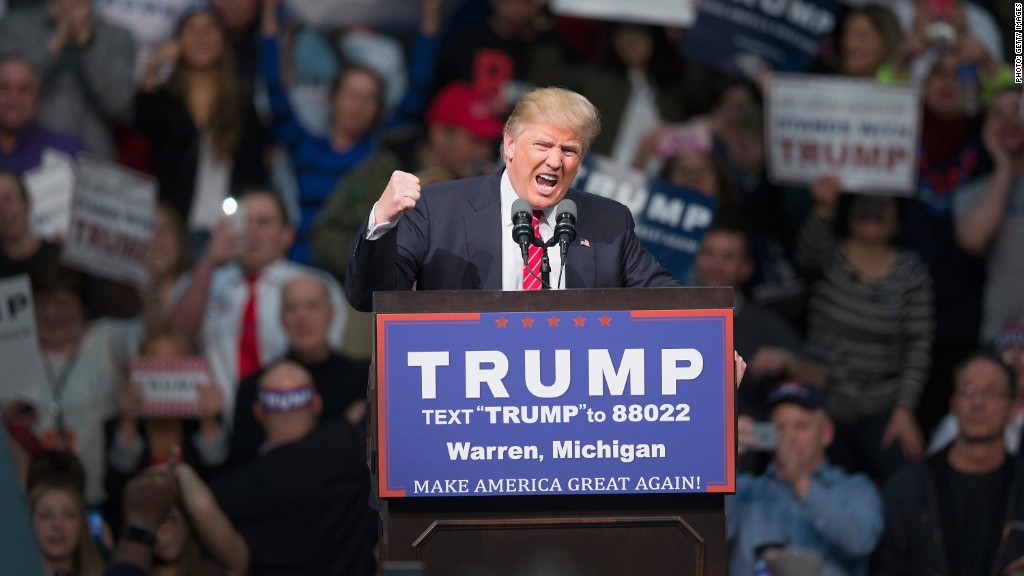
The economy is the top issue on American voters' minds -- by far.
With six month to go until Election Day, voters are extremely anxious about their financial future. The 2008 crisis lingers in people's minds and many feel like they're one step away from financial disaster even if they have jobs and things are looking up economically for folks around them.
So how is the U.S. economy really doing? There are two main takeaways:
1. The U.S. is in a lot better place than it was eight years ago in the Great Recession.
2. But the economy is definitely not back at full force. It's growing at about 2% a year, less than the historic average of over 3%.
So what can the next president -- be it Hillary Clinton, Donald Trump, Bernie Sanders or a "dark horse" -- do to boost growth?
There's actually a decent amount of consensus among economists about what should be done.
"The economic of this is very simple," says economist Robert Denk of the National Association of Home Builders. "The politics is the thing that's hard to understand."
Related: Billionaire Mark Cuban predicts stock market crash if Trump wins
Here are the top ideas for the economy:
1. Corporate tax reform
"Our tax system is extremely uncompetitive internationally," says Lynn Reaser, chief economist at the Fermanian Business and Economic Institute at Point Loma Nazarene University.
It's so bad that U.S. businesses have moved overseas just to lower their tax bills. The top marginal U.S. corporate tax rate is 39%. The next highest rate in the west is France with a 34.4% top corporate rate, according to the Tax Foundation. The worldwide average is under 23%. On top of that, the U.S. has a very complex system of credits and deductions.
Reaser argues that lowering tax rates is "probably the fastest short-term boost we could deliver for the economy."
Mark Hamrick, the Washington bureau chief of Bankrate.com, believes corporate tax reform has the "greatest opportunity for bipartisan support" next year.
Related: Who owns America's debt?
2. Reduce uncertainty
"Uncertainty is one of the reasons that businesses aren't investing," says Bill Watkins, executive director of the Center for Economic Research and Forecasting at Cal Lutheran at a former economist at the Federal Reserve.
Hardly anyone wants to put their money on the line when they are highly unsure about the future. What will the taxes be? What will the regulations be? What about borrowing costs?
Decisive statements from the country's leader would help.
At the moment, there's a lot up in the air about what will happen with Obamacare, taxes, trade deals, and the Federal Reserve's interest rate decisions. That's on top of one of the most unpredictable presidential elections in modern U.S. history.
Businesses are reacting by sitting on near record piles of cash. To change that, CEOs and economists are increasingly asking lawmakers to write clearer laws and take a look at what regulations need to stay versus what can go.
Related: America's top 10 job-killing companies
3. Infrastructure spending
Congress has to bump up money for infrastructure: roads, bridges, dams, power lines, etc. Study after study points out the aging infrastructure in need of repair just to be suitable for current business activity. And that's to say nothing of the investments the country needs for the future, especially a high-tech future.
"Our infrastructure is crumbling. Interest rates are historically low but set to rise, so it's a good time to do it," says economist Denk. He argues it would lift hiring and growth to get some projects going right away, but it doesn't have to be done all at once like the massive stimulus package.
Former Fed chair Ben Bernanke is one of many voices calling on Congress to boost spending -- selectively.
"When the central bank is out of ammunition or ammunition is low, fiscal policy has a role to play," Bernanke said in April.
Related: Americans give the economy a "C" grade
Bonus: Fix Social Security & Medicare
There are other policies that could help beef up U.S. growth, such as better education for the high-tech economy, a better immigration system to prioritize what the country needs and more trade deals.
But the final item that appears on almost all economic wish lists is so-called entitlement reform. It means fixing Social Security and Medicare so they won't go bankrupt or add severely to the national debt.
There's wide agreement that raising the age that people can receive benefits and raising taxes -- or some combination of both of those -- will be necessary. The framework for a solution exists, but so far, the political will to act does not. Addressing this won't boost growth overnight, but it will set America up on a much stronger financial path for years to come.
When will the real policy talk begin?
For now, most economists chuckle at what they hear so far on the campaign trail.
"We need real discussion of growth," Glenn Hubbard, dean of the Columbia Business School and a former top economic adviser to President George W. Bush, told CNBC Tuesday. "Right now, I haven't heard serious ideas from either one, to be honest."


